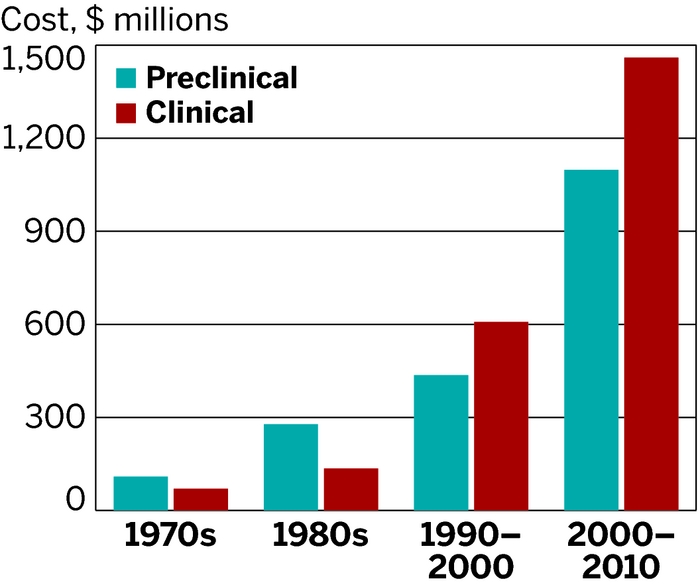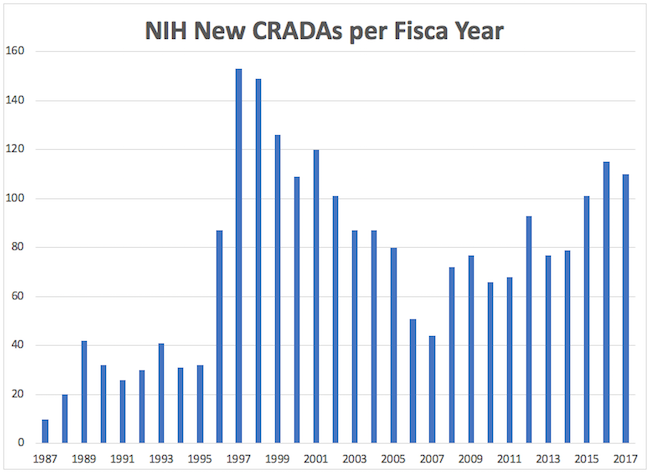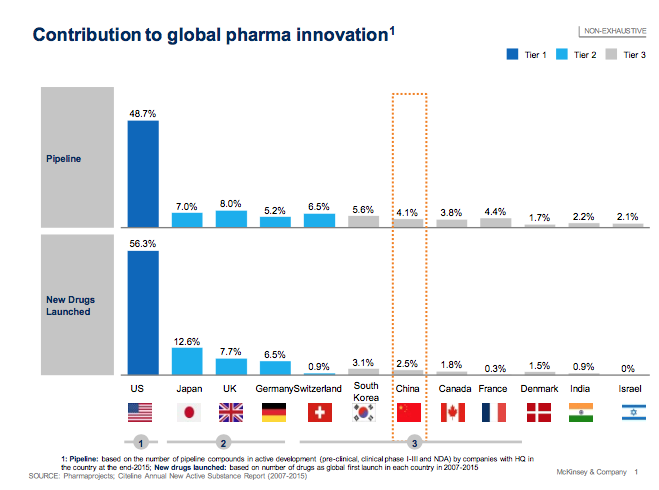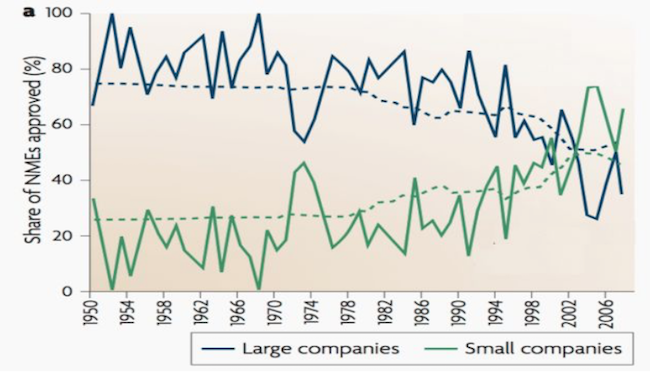Past attempts to impose artificial “reasonable pricing” requirements on developers of government supported innovation did not result in cheaper drugs. A study on compulsory licensing found resulting drug prices are often higher.

Image Source: Deposit Photos.
You have to give Rep. Lloyd Doggett (D-TX) credit for being consistent. He’s one of the most determined advocates for misapplying the Bayh-Dole Act so the government can license competitors when he feels that drugs arising from federally-supported R&D aren’t “reasonably priced.” Luckily, both Republican and Democratic Administrations rejected that wrongheaded idea. But rather than being discouraged, he’s taken that philosophy to a new level.
He recently introduced the Medicare Negotiation and Competitive Licensing Act of 2018. Lest the title confuse you, by “competitive licensing” Rep. Doggett means compulsory licensing anytime a company declines to sell their drug for whatever price the Secretary of Health and Human Services cares to offer during “Medicare negotiations” where the government holds all the cards.
Negotiating under the Doggett bill is like dealing with the Godfather. The company is given “an offer it can’t refuse.” If they decline instead of finding a severed horse’s head in their bed, the government confiscates the invention (along with any clinical trial data and regulatory exclusivities needed to produce the drug) for competitors to use. The patent owner gets “reasonable compensation” — as determined by the government. If they don’t like the offer they can sue.
And unlike compulsory licensing under international agreements, there is no need for the government to allege that the drug isn’t readily available or that there’s an unmet medical emergency. All that ‘s required is for the bureaucracy to dislike the price of a drug. This is done under the guise of promoting the public interest.
While the bill won’t go anywhere this year, almost half of the Democrats in the U.S. House of Representatives are co-sponsors. If this is a preview of coming attractions should control of the House change after the election, American innovation is in serious trouble.
Since a picture is worth a thousand words, rather than offering detailed explanations why the Doggett approach is a more likely to cripple our life science industry than to reduce drug prices, let’s look at some charts.
The first from Scientific American is titled The cost of developing a new drug has skyrocketed since the 1970s.

Source: https://www.scientificamerican.com/article/cost-to-develop-new-pharmaceutical-drug-now-exceeds-2-5b/
One reason is the odds against developing a new drug are staggering.
What the critics overlook is that a drug which makes it through the pipeline must pay the costs of its 9,999 brothers and sisters which died in the process. To make this even worse, only 20% of successfully developed drugs turn a profit. If a financial advisor talked you into investing your retirement savings in a plan with these odds of success, they’d be in jail.
The U.S. is one of the few countries willing to assume the risks of developing new drugs and is far and away the largest source of all of the world’s therapeutics.
And our dominance is increasing.
When other countries impose artificial price controls on drugs, the burden primarily falls on U.S. companies. That’s a reason why prices are higher here— we’re subsidizing drug development for the rest of the world.
The U.S. is also unique as more than half of our new drugs come from small companies.
Strong patent protection is critical for start up’s to raise the tremendous amounts of risk capital required for drug development and to protect them against larger competitors.These patents protect a product which has taken more than a decade to develop while stakeholders anxiously await some return on their investment.
Losing their patents and know-how through a compulsory license would be the death knell for small companies which are often the source of breakthrough, high risk drugs desperately needed by suffering patients. Do the critics ever wonder who’s going to create the drugs of the future if they make the process even more daunting?
A key advantage the U.S. enjoys over our competitors is the commercialization of federally funded inventions. Private/public sector partnerships are important parts of our innovation pipeline. However, federally funded inventions are more like ideas than products. A study in Nature estimates that companies spend $100 in development for every $1 the government spent in research leading to medical inventions. Even then the odds remain stacked against successful commercialization. These companies are not getting a free ride.
Yet that’s exactly what promoters of the Doggett bill claim:
As Americans, we pay the highest drug prices in the world. Indeed, we pay twice. Our tax dollars fund the research that results in those blockbuster medications from which Big Pharma profits. Every single one.
That is no exaggeration. A recent study, published in the Proceedings of the National Academy of Sciences, has found that the development of every single one of the 210 new drugs approved by the federal government from 2010 through 2016 involved research funded by the National Institutes of Health. Our tax dollars fund NIH’s annual research budget, which amounts to over $37 billion in 2018.
Yet this tax-supported research does not provide us with affordable drugs.
Past attempts to impose artificial “reasonable pricing” requirements on developers of government supported inventions did not result in cheaper drugs. Rather, companies simply walked away from partnerships as indicated by the chart below on “cooperative R&D agreements” (CRADAS) with the National Institutes of Health. CRADAS began in the late 1980’s and rapidly increased until the reasonable pricing requirement hit. The immediate impact was the dip seen below. NIH revoked the program in 1995 since its only impact was undermining scientific cooperation without generating any public benefits. CRADAs then exploded in 1996, and are once again on the rise.

Source: Congressional Research Service and NIH Annual Reports.
Perhaps the ultimate irony of the Doggett approach is that compulsory licensing hasn’t been effective in lowering drug costs in developing countries. A study titled Compulsory Licensing Often Did Not Produce Lower Prices For Antiretrovirals Compared to International Procurement found that resulting drug prices were often higher than they would have been under a more cooperative approach. It concludes:
That fact makes it all the more important for governments to make medicine procurement choices through transparent, collaborative processes in which governments and multilateral and charitable actors work in a collective or pooled fashion with medicine suppliers. As the global disease burden shifts toward illnesses that can be treated with novel medicines, this sort of approach is likely to come closest to the shared goal of equitable access.
If compulsory licensing doesn’t work in the developing world, why would anyone believe it would be more effective here?
There would be one beneficiary of the Doggett legislation, but it won’t be patients. While the bill would devastate our life science industry it would be a boon to China, which is desperately trying to eclipse our innovation lead. While our patent system unravels, theirs is getting stronger, attracting foreign companies and promoting internal innovation. Now some of our leaders are flirting with compulsory licensing. Life science companies could come to view communist China as a better place to do business than the United States.
Rep. Doggett and his colleagues would do well to rethink their approach. Having to rely on Chinese companies for our drugs wouldn’t be very pleasant. They’ve had a belly full of democratic socialism and would view squeals from our politicians over prices they’d charge with contempt.
Compulsory licensing only makes the problems with our health care system much, much worse. For the sake of those suffering from disease, let’s pray we don’t ever follow leaders herding us over this cliff.

![[IPWatchdog Logo]](https://ipwatchdog.com/wp-content/themes/IPWatchdog%20-%202023/assets/images/temp/logo-small@2x.png)





![[Advertisement]](https://ipwatchdog.com/wp-content/uploads/2024/04/UnitedLex-May-2-2024-sidebar-700x500-1.jpg)
![[Advertisement]](https://ipwatchdog.com/wp-content/uploads/2024/04/Artificial-Intelligence-2024-REPLAY-sidebar-700x500-corrected.jpg)
![[Advertisement]](https://ipwatchdog.com/wp-content/uploads/2024/04/Patent-Litigation-Masters-2024-sidebar-700x500-1.jpg)

![[Advertisement]](https://ipwatchdog.com/wp-content/uploads/2021/12/WEBINAR-336-x-280-px.png)
![[Advertisement]](https://ipwatchdog.com/wp-content/uploads/2021/12/2021-Patent-Practice-on-Demand-recorded-Feb-2021-336-x-280.jpg)
![[Advertisement]](https://ipwatchdog.com/wp-content/uploads/2021/12/Ad-4-The-Invent-Patent-System™.png)






Join the Discussion
42 comments so far.
Anon
September 5, 2018 05:18 pmNo problem Gene – I was trying to join a meaningful conversation (and I refused to let the Tr011 have the last word). My apologies for subjecting readers to the nonsense, but Tr011s like that need to be put into their place. I was just not going to give him the satisfaction of the last word.
Gene Quinn
September 5, 2018 05:00 pmApologies to everyone commenting on this thread. I did not notice the ignorance and abuse from “Bang Ding Ow”. His comments have been marked as spam and he has been banned.
Anon
September 5, 2018 10:58 amWell at least that was a bit creative.
Still misguided and still avoiding any meaningful dialogue on the legal issue, but at least creatively so.
I remain on the high road and invite you to a meaningful legal discussion. “Dog” memes, no matter how creative, will not get you there.
Anon
September 5, 2018 08:33 amAs much as you find yourself amusing, you may want to apply that “light” that you seek to cast me in.
Which of the two of us has been the dog?
Then, after you realize just how foolish your tactics have been, maybe, maybe then, you will take me up on my offer and actually try to discuss the legal point at hand (instead of hiding behind your ad hominem).
Still your choice.
Anon
September 4, 2018 08:06 pmIt’s as if you are addicted to denigrating yourself.
That’s fine by me – I will continue to take the high road and invite you to contribute something meaningful.
Your choice.
Anon
September 4, 2018 08:38 amShall we tally the score here of comments that reflect the “woof” nature? How about a tally of comments that seek the high road versus those that merely employ mindless ad hominem? Do you really think that your path here does anything but reflect poorly on you?
Anon
September 3, 2018 09:29 amTry – just a little – please.
(and no, that does not mean that cutting and pasting your previous mindless ad hominem ‘counts’ as trying)
All that you are doing is proving my point. Is that really what you want to do?
Anon
September 2, 2018 11:27 pmAre you even trying at this point?
How about this: try to present a cogent legal view of the issue here.
Pretend that you are posting on a blog and that some members of the audience to which you are addressing satisfy whatever it is that you desire in an informed audience of attorneys (this way, you can eliminate your running desire to ONLY engage in ad hominem).
Will we (anyone) see anything of merit from you?
Your choice.
Still.
Anon
September 1, 2018 04:43 amAs I noted, you actually supporting whatever it is that is your legal position does not entail dealing with anyone else.
Your ad hominem is simply a poor smokescreen for your own lack of legal knowledge.
Is that why you so ardently avoid any hint at the – on point – legal view?
Anon
August 31, 2018 09:39 pmClearly, you still do not have a clue.
With your propensity to NOT even try to discuss legal items, and your propensity to engage in mindless ad hominem, your tendencies would appear to be more reflection of your own inadequacies.
Why else would you so adamantly refuse to engage – in a forum intended for engagement?
Are you familiar with the phrase: Put up or shut up..?
How many invitations are you going to let pass by?
By the way, it matters not at all who else may be “out there” for you to actually make YOUR Legal case. You have yet to come anywhere close to doing so (spending an inordinate amount of your energy on ad hominem).
Still your choice.
Bang Ding Ow
August 31, 2018 08:13 amI again invite you to elevate your game and join me on the high road for an actual discussion of the pertinent legal issues.
—
Sure, Fido (D) .. right after you post a JPG of your law school degree ..
WOOF!!
Anon
August 30, 2018 08:38 pmIt’s too bad that your “imagination” runs to such a sordid place. Just think of what the discussion could be like if you put half that effort into some cogent legal reasoning instead of the baseless ad hominem.
I again invite you to elevate your game and join me on the high road for an actual discussion of the pertinent legal issues.
Anon
August 30, 2018 05:48 pmYour “third notice” is as ineffectual as your first (and your “theme” won’t get better with repetition – but hey, at least here you indicate “Final,” so we both have that going for us).
I still have the high ground with my invitation to you to provide some cogent (on point) Legal reasoning.
I remain open to actually discussing the legal point here, even as you seem intent (and sadly, content) on only employing ad hominem.
Um, you do know what the legal points are here, right? I just realize that you may not. You may be reacting entirely out of emotion and might not have a clue as to HOW to respond in an intelligent and reasonable manner.
Anon
August 30, 2018 10:11 amYour “second notice” is as ineffectual as your first (and your “theme” won’t get better with repetition).
I still have the high ground with my invitation to you to provide some cogent (on point) Legal reasoning.
Heck, what I ask of you is even “easier” than providing on point legal citations (which for all your desire of me, YOU have not done). Do you realize that a blog on law provides a forum for a discussion on legal points that does not require actual citations?
I remain open to actually discussing the legal point here, even as you seem intent (and sadly, content) on only employing ad hominem.
Anon
August 30, 2018 09:12 amMore of the same empty name calling.
Is that all that you have? Maybe once that is out of your system (and perhaps you have some time to actually think about the particular legal issue here), you will engage in some minimally meaningful manner.
The decision is yours. Please feel free to engage meaningfully or to merely dig your hole deeper.
By the way, not sure where you are pulling your understanding of law school, but providing irrelevant legal citations is actually worse than no legal citations – if cogent legal reasoning is present. As is then, your relative merit started lower, and your continued “one trick pony” show is not the manner for you to improve that position.
Anon
August 30, 2018 07:09 amName calling.
Do you realize that your refusal to engage on any merits of pertinent law make you the proper target for such names?
Come now Bang Ding Ow, can you do more than call names?
Anon
August 29, 2018 08:48 pmThanks again for proving my point with yet another post from you with mindless ad hominem, vacuous and unconnected snippets of law, and and absolute avoidance of an attempt to discuss the particular legal issues at point here.
Sooner or later you might realize that your continued use of your “tactics” only impugns you – and continue to strengthen my case.
I have no problem feeding this cycle as long as you want to keep at it.
Maybe you might eventually realize that my asking you to engage in a meaningful manner – and your refusal – will only end up hurting you.
For any “joy” you might think that you are getting from “tr011ing,” I am getting more joy by watching you dig deeper and deeper.
Of course, better joy would come – for both of us – if you would at least try to advance some meaningful (on point) legal reasoning.
Your choice.
Anon
August 29, 2018 01:56 pmSee what happens when you think (in error) that merely putting up a legal citation provided ANY substance to a legal discussion?
Fifth amendment… really? How is that germane?
All that you have done, by putting up a mindless legal citation unconnected to the point of law at hand, accompanied by the mindless ad hominem, is prove my case for me.
You can keep on proving my case for me, or you can decide to pay heed to my posts to you.
Your choice.
Anon
August 29, 2018 09:07 amHere’s an idea, Bang Ding Ow,
Let’s have your next response be solely on the legal merits.
Drop the ad hominem.
Take any numbers you want to provide as given.
What is it that you want to do – legally – with your numbers?
You appear to delve into the ad hominem because you have nowhere else left to go.
The only thing left is to discuss the legal points.
Let’s try that, shall we?
Anon
August 29, 2018 07:29 amIs that your idea of cogent legal reasoning, Bang Ding Ow?
Anon
August 28, 2018 09:26 pmYou think that “Legal Citations” are needed for the items that I have posted?
Maybe instead of the yammering and “you got nothing,” you take a stab at that “nothing,” and come up with some cogent legal reasoning why you are so “sure” of your Legal position.
Anon
August 28, 2018 05:45 pmBang Ding Ow,
What is the relevancy (to the legal point) of the numbers you share?
You do understand that you are on a legal blog, talking about legal matters, right?
Anon
August 28, 2018 02:06 pmBang Ding Ow,
Your production of numbers simply do not address the legal points under consideration.
See posts 10, 12, 14, 16, 18 and 23.
Your /sarc/ is misplaced. That you seem oblivious to this misplacement is just not a plus for you.
Anon
August 28, 2018 09:37 amJoachim,
I grant that there are plenty of “bad” engineers, and may even grant that software engineering may even have more than their fair share, but that does not change the nature of engineering. By the way, some family members are in the midst of civil engineers that “act” like your proverbial “bad” software engineers relating to some serious discrepancies with their new home.
I would dare say even that one factor (and by no means the only factor and mayhap not even perhaps a prominent factor) for identifying a “bad” engineer is what I consider to be a “false” distinction between a “problem solving mode” that you attribute to be more amenable to a scientist or mathematician versus what I would call a “mere technician” who only applies known tools. Engineering entails more than a “cookbook” understanding, and good engineers are taught – and apply – real investigative prowess (rivaling any scientist). As for mathematicians, I tend to separate them into an entirely different group altogether.
Bang Ding Ow
August 28, 2018 09:29 amAll that you are doing is yammering.
—
I’ve produced #s. You’ve produced nothing, thanks. /sarc/
Joachim Martillo
August 28, 2018 08:27 amIt’s possible that I have turned cynical on software engineers
1) because of experience with coders, who think they are engineers, and
2) because of the fad for agile project management as means of managing a project that blends IT infrastructure extension with software development into something weird that seems to absolve the management of responsibility for engineering mismanagement.
BTW, I have never see the insanity on a civil engineering project that I invariably encounter in software engineering projects. I have found that software engineers that learned their craft in the military generally act like engineers and not like cats playing with a ball of string. Thus I concede the possibility of software engineering, but software engineering in the USA outside of the military seems completely broken.
Anon
August 28, 2018 07:10 amJoachim,
Your contraint as to how you are defining “real engineer” is what is off.
The “nonsense” that you want to identify in software engineering exists – in spades – in all your “hard” engineering areas as well.
Bang Ding Ow,
All that you are doing is yammering. You seek to denigrate something you clearly do not grasp, while the point under discussion is directly tied to the very thing that you do not grasp.
Joachim Martillo
August 28, 2018 04:16 amI have also managed at software engineering companies and on civil engineering projects. I used to hold a faculty position at MIT. Software engineers are questionably engineers because they don’t address the problems in an engineering manner that was already known to Vitruvius over 2000 years and that was probably old when Vitruvius wrote De Architectura.
The classic 19th and pre-high-tech 20th century definition of an engineer was someone that could organize to get a job done for $1 when it would take a non-engineer at least $2.
Engineering is not a science. It is an art. It means identifying effective combinations of existing technologies. It requires coordination, scheduling, budgeting, and identification of dependencies, It should not require plunging forward into unknown areas where a scientist or mathematician is more appropriate. Ego should not play a role in effectively creating product, nor should religious warfare nor all the other nonsense that takes place in software engineering. Engineering requires constant learning and application of newly learned techniques. Engineers need to understand process — an understanding never required in mathematics or science.
When I was on the faculty at MIT, there was a big debate whether engineering is a science or an art. I am in the art faction because engineering requires essentially an apprenticeship phase during which an engineer gets a feel for the tools, the components, and economics associated within the area of engineering in which an engineer is working.
Hardware engineers usually have a fairly good feel for engineering (although I suspect improvements in simulation for chip development tends to remove VLSI engineers from genuine engineering to something closer to software pseudo-engineering.)
Anon
August 27, 2018 10:23 pmYour “questionable” vis a vis software is out to lunch.
(Coming from management experience over several of the areas you listed)
Joachim Martillo
August 27, 2018 07:18 pmI have the impression that nobody is this discussion has much experience in Operations Research. I also have to doubt much experience in Civil, Aeronautics, Chemical, Mechanical, Electronic, or Automotive Engineering, which are true engineering disciplines unlike Software Engineering, which is questionably an area of engineering.
If I am an engineer that improves the process of drug development and lowers the cost, I expect more failures because understanding a drug development failure helps us develop the next successful drug. If we do the analysis in Operations Research, we probably won’t see the total cost of failure go down at any pharmaceutical firm. We will see an scaling up of the knowledge that enables the next new drug.
Note that there may be considerable lag time before the business size scales up.
Likewise computerizing rarely reduces total costs, but it eventually scales up the business size.
Anon
August 27, 2018 07:13 pmI have intimate knowledge on at least two matters that I was involved in on the litigation front. I am not going to share the matters (or the costs). But your level of juvenile reaction is more evidence than anyone needs that you are – quite frankly – speaking out of your ass.
Any time you want to actually discuss a point of law. I am here ready, willing, able and waiting.
Anon
August 27, 2018 02:33 pmI need not prove a specific number.
Clearly, you are consumed by irrelevancies – irrelevancies in view of the legal principles involved.
Huge difference between knowing singularly specific facts and knowing the governing legal principles.
Please feel free to open your eyes to the actual issues here. It might help you get a handle on your emotions.
Anon
August 27, 2018 11:18 amBang Ding Ow,
Your protests avail you naught.
That you may want to overlook the substance I have provided does NOT make that substance disappear.
Your “appeal” as to whether or not I have a MD/PhD is misguided as you simply do not know if such an assertion is even true, and further, such an assertion, even if true, has no bearing on the legal points here.
By the way, I very much do understand the costs of “Clinical Trial III,” so what point were you attempting with that non-sequitur?
Finally, please do not throw in a mindless Latin phrase – you only emphasize your lack of understanding by doing so (and strengthen the postion against which you struggle).
Anon
August 27, 2018 07:39 amQuite to the contrary, Bang Ding Ow, my production of something useful is a solid legal understanding.
THAT is eminently useful.
Your snide attempt in retaliation is a miss. Maybe instead of the snide comment, you attempt a meaningful rebuttal? You might attempt to point out where my view is not correct (and why). You might attempt to show how I have the basics of patent law incorrect. You might show where my logic is not correct.
You might at least try.
Anon
August 25, 2018 11:42 am“Well… post one” entirely missed the point.
Yes, we all should be eager for such “posting.” In fact, we should be wanting to grant patents for such – and NOT integrating the deficiency into the development cycle by allowing the view that failure of other innovative efforts is somehow rightfully reflected in some type of “positive right” of making money for different innovations.
I doubt that you meant to do so, Bang Ding Ow, but you have strengthened my point, so Thank You.
Anon
August 24, 2018 03:37 pmmike @7,
I would posit that it is NOT I that is doing the conflating.
Quite the opposite – I am the one calling for NOT conflating the two.
When one approaches the basics of patent law (no guarantee of profit, a negative right, the right attaching SOLELY to the single innovation, NOT tied to any other efforts), one should easily see that my view is absolutely correct.
Whether or not “economic reality” is invited in (e.g., THE conflation), is quite a different matter.
Further, I NEED NOT compare this to any other field. NO other field attempts this conflation (which, in part, is WHY this is a pet peeve for me).
As to your hypo, you do realize that the mechanic would NEVER charge “just the five minutes,” as the time spent analyzing would ALWAYS be included in the labor component.
mike
August 24, 2018 12:18 pmAnon,
You seem to be conflating the “must” of a moral imperative with the “must” of an economic reality. Companies will not survive if they cannot pay their bills. Pharmaceutical companies face very long odds, and if the payout for success will not cover the cost of the multiple failures to be expected, there will be no pharmaceutical research.
Compare it to getting an intermittent electrical issue in your car repaired. It may take a good analyst hours to discover that a loose wire is causing the issue, and 5 minutes with a screwdriver to fix it. Do you think you will find a mechanic willing to look at your car if he knows that in the end, all he will get paid for is five minutes of labor to do the actual repair?
Robert Reynolds
August 24, 2018 10:49 amJoe, I have to agree with Anon here. There are very real costs associated with the development of new drugs, absolutely.
However, I can’t help but think that a business that can’t control its R&D costs without relying on a Hail Mary payoff should perhaps reconsider its approach. Further, it’s troubling that an entire *industry* relies on this huge gamble. Surely there’s at least ONE other way than the “one in ten thousand” method to turn a profit.
Disclaimer: certainly not an expert, just looking to learn.
Anon
August 24, 2018 10:42 amMr. Allen,
While the facts you present are true (there are very real costs, the further things fail down the pipeline, the more sunk costs one will have, everyone must pay their bills), MY statements remain true.
One does not have to indulge in the fallacy of “must.”
In fact, one should fight that fallacy for the reasons I provided: indulging the fallacy removes from view that the costs and uncertainties are an area in and of themselves that should be a focus of innovation (and such won’t happen when “guarantees” are baked in) – AND the patent system is a system of negative rights – NOT positive guarantees of making money (even for a single item, let alone the expanded version of “all those other failed attempts”).
No sir, the fallacy you embrace is a perversion of the basics of patent law.
I “get” that this perversions appears to work in favor of being “pro-patent,” but as is often stated for the Goose: The Ends do not justify the Means. I invite you to apply this to the Gander here. There is no need to incorporate this fallacy, and there is real harm in doing so.
Joe Allen
August 24, 2018 09:00 amAnon: There are very real costs associated with trying to turn a compound into a new drug and the further they fail down the development pipeline, the greater the expense. Just like the rest of us, drug developers must pay their bills and the only way to do that is through sales of the one in 10,000 which makes it to the marketplace.
EG
August 24, 2018 08:16 amHey Joe,
As you correctly point out, this proposal for compulsory licensing in the drug area won’t lower drug prices, but will simply cause such research to cease. The U.S. shouldn’t make the same mistake (i.e., compulsory licensing and working requirements) that many other countries around the world have made.
Anon
August 24, 2018 07:49 amThis fallacy is a pet peeve of mine: “What the critics overlook is that a drug which makes it through the pipeline must pay the costs of its 9,999 brothers and sisters which died in the process.”
There is NO “must” there.
In fact, by attempting to insert a “must,” we remove from consideration changes and innovations related to making THAT process better. By subsidizing failure – which is what happens when we insert the “must,” we perpetuate that which should be focused on to be reduced, mitigated, eliminated.
Patents are NOT some “positive” guarantee of making money for other attempts. Patents are NOT even some “positive” guarantee of making money for the immediate item.
The rhetoric (on this particular point) is not accepted.